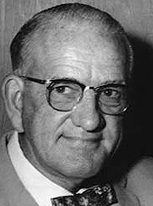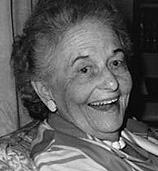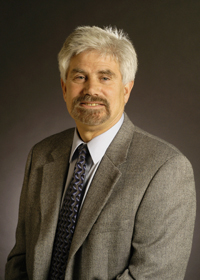 ISAAC MORRIS HAY, a general practitioner, established the first and only hospital in Melbourne, Florida, in 1929.
ISAAC MORRIS HAY, a general practitioner, established the first and only hospital in Melbourne, Florida, in 1929.
 His wife, LUCILLE ELIZABETH HAY, assisted with administrative and caretaker duties in addition to raising three children. The private hospital weathered the Great Depression and eventually obtained much-needed outside support when it became the Brevard County Hospital.
His wife, LUCILLE ELIZABETH HAY, assisted with administrative and caretaker duties in addition to raising three children. The private hospital weathered the Great Depression and eventually obtained much-needed outside support when it became the Brevard County Hospital.
Held by Peter N. Devreotes
 PETER N. DEVREOTES, A&S 1977 (PhD), Isaac Morris Hay and Lucille Elizabeth Hay Professor and director of the Department of Cell Biology, received his PhD from Hopkins in 1977 and returned to join the Hopkins faculty in 1980 in the Department of Biological Chemistry. He is recognized internationally as the leader in the field of chemotaxis. He was the first to identify chemoattractant receptors and visualize their activation in living cells. His discovery that selected signaling events occur at the cell’s leading edge unveiled a strategy that cells use to sense the direction of spatial gradients. His group is currently pursuing further understanding of chemotaxis. Using the amoeba Dictyostelium as a model system, Dr. Devreotes’ research focuses on identifying the genes responsible for a cell’s “sense of direction.” During embryogenesis and in the adult, cells use chemical gradients to direct their movements to find and maintain their proper positions. The process, referred to as chemotaxis, is not only used in normal physiology but in inflammatory diseases and cancer metastasis.
PETER N. DEVREOTES, A&S 1977 (PhD), Isaac Morris Hay and Lucille Elizabeth Hay Professor and director of the Department of Cell Biology, received his PhD from Hopkins in 1977 and returned to join the Hopkins faculty in 1980 in the Department of Biological Chemistry. He is recognized internationally as the leader in the field of chemotaxis. He was the first to identify chemoattractant receptors and visualize their activation in living cells. His discovery that selected signaling events occur at the cell’s leading edge unveiled a strategy that cells use to sense the direction of spatial gradients. His group is currently pursuing further understanding of chemotaxis. Using the amoeba Dictyostelium as a model system, Dr. Devreotes’ research focuses on identifying the genes responsible for a cell’s “sense of direction.” During embryogenesis and in the adult, cells use chemical gradients to direct their movements to find and maintain their proper positions. The process, referred to as chemotaxis, is not only used in normal physiology but in inflammatory diseases and cancer metastasis.
Dr. Devreotes was elected to the National Academy of Sciences in 2005 for his research achievements and also won a National Institutes of Health Merit Award that same year. He has been an elected council member of the American Society for Cell Biology and associate editor for Molecular Biology of the Cell and he currently serves on the advisory boards of the Cell Migration Consortium and the Searle Scholar Program.
 ISAAC MORRIS HAY, a general practitioner, established the first and only hospital in Melbourne, Florida, in 1929.
ISAAC MORRIS HAY, a general practitioner, established the first and only hospital in Melbourne, Florida, in 1929. His wife, LUCILLE ELIZABETH HAY, assisted with administrative and caretaker duties in addition to raising three children. The private hospital weathered the Great Depression and eventually obtained much-needed outside support when it became the Brevard County Hospital.
His wife, LUCILLE ELIZABETH HAY, assisted with administrative and caretaker duties in addition to raising three children. The private hospital weathered the Great Depression and eventually obtained much-needed outside support when it became the Brevard County Hospital.